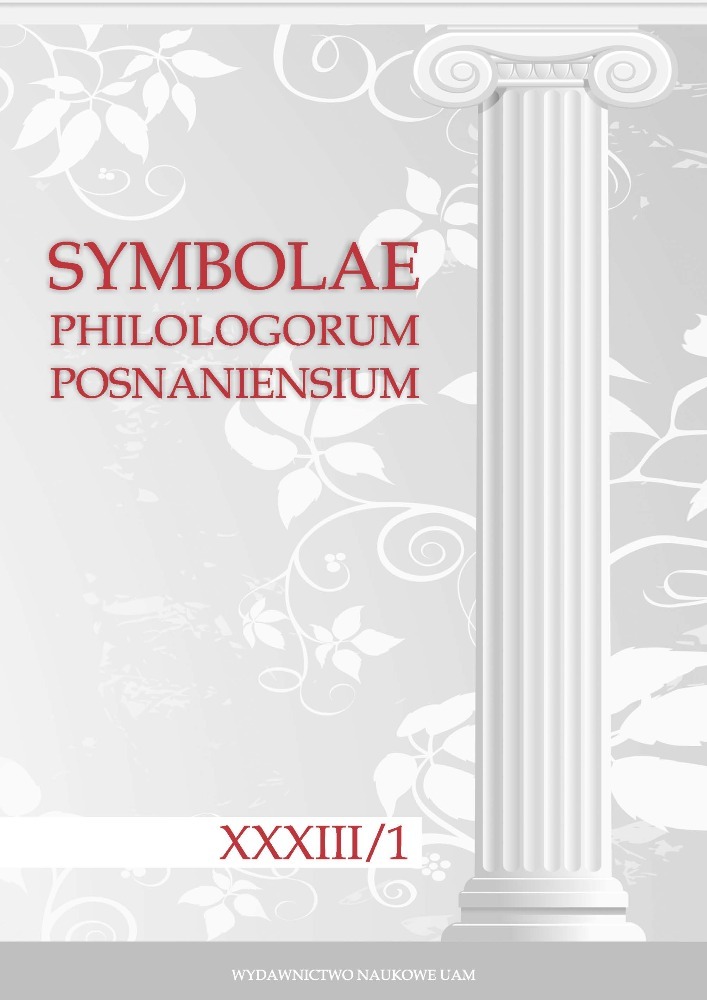Abstrakt
The paper contains a thorough examination of the criteria used by the ancient Greeks for defining, describing and classifying the phones of the language. References are made to works by Plato and Aristotle, as well as to the text of the Techne grammatike attributed to Dionysius Thrax. In the dialogues of Plato, and especially in the Cratylus, one can find the first categorical characteristics of different groups of phones, formulated in acoustic terms, as well as individual descriptions of the mimetic qualities of particular phones, based on either sound effects or articulatory features. In Poetics, Aristotle defined the phone as such, connecting it with the notion of voice characterized by indivisibility, ability to create a complex voice (i.e. a word) and exclusively human origin. In setting out three main classes of phones, he based their definitional criteria on their articulatory features (the contact of speech organs or lack of it) on the one hand, and on their phonetic and acoustic properties (audible voice), i.e. on sound distinctness manifesting itself in acoustic autonomy on the other. In the Techne grammatike, in turn, particular classes of phones were identified and defined by formulating the conditions in which they produce voice characterized by a definite – high or law – aesthetic value. Despite the absence of an articulatory criterion, Greek grammarians succeeded in distinguishing all basic classes of phones, although they constantly looked at phones through the prism of letters, which led to them confusing the phonetic level with the graphic one, and thus made it impossible to create a conceptual and terminological apparatus which would be the means appropriate for identifying and describing correctly the whole stock of Greek phones.
Bibliografia
Aristotelis De Arte Poetica Liber, recognovit brevique adnotatione critica instruxit R. Kassel, Oxonii 1965.
Aristotle, The Categories, On Interpretation, edited et transl. by H.P. Cooke, The Loeb Classical Library, vol. CCCXXV, London 2002 (19381).
M. Callipo, Dionisio Trace e la tradizione grammaticale, Roma 2011.
Diogenis Laertii Vitae Philosophorum, recognovit brevique adnotatione critica instruxit H.S. Long, Oxonii 1964.
Dionysii Thracis Ars Grammatica, ed. G. Uhlig, Grammatici Graeci I 1, Lipsiae 1883.
D.W. Lucas, Aristotle, Poetics, Oxford 1968. DOI: https://doi.org/10.1093/oseo/instance.00262091
E. Montanari, La sezione linguistica del ‘Peri hermeneias’ di Aristotele, vol. II: Il commento, Firenze 1988.
G.B. Pecorella, Dionisio Trace, ΤΕΧΝΗ ΓΡΑΜΜΑΤΙΚΗ, testo critico e commento, Bologna 1962.
Platonis Opera, recognovit brevique adnotatione critica instruxit J. Burnet, Oxonii, vol. I 1900, vol. II 1901.
H. Podbielski, Arystoteles. Poetyka, Wrocław 1983.
Allen 1968: W.S. Allen, Vox Graeca: A Guide to the Pronunciaton of Classical Greek, Cambridge 1968.
Gallop 1963: D. Gallop, Plato and the Alphabet, „Philosophical Review” 72 (1963), 364–376. DOI: https://doi.org/10.2307/2183168
Kaczmarkowski 1985: M. Kaczmarkowski, Świadomość językowa w ‘Kratylosie’ Platona, „Roczniki Humanistyczne KUL” 33 (1985), nr 6, 19–28.
Kretzmann 1974: N. Kretzmann, Aristotle on Spoken Sound Significant by Convention, w: Ancient Logic and Its Modern Interpretations, ed. J. Corcoran, Dordrecht–Holland 1974, 3–21. DOI: https://doi.org/10.1007/978-94-010-2130-2_1
Liddell, Scott, Jones 1940: H.G. Liddell, R. Scott, H.S. Jones, A Greek-English Lexicon, Oxford 19409 (1843).
Maciejewska 1994: A. Maciejewska, Początki greckiej terminologii gramatycznej (do Platona), „Meander” 9 (1994), 487–492.
Popowski 1987: R. Popowski, Dionizjos Trak i jego ‘Gramatyka’, „Roczniki Humanistyczne KUL” 35 (1987), nr 3, 59–87.
Ryle 1960: G. Ryle, Letters and Syllables in Plato, „Philosophical Review” 69 (1960), 431–451. DOI: https://doi.org/10.2307/2183479


